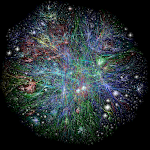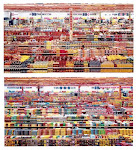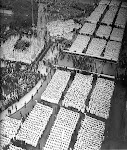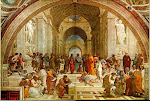Key words: freedom, Modernity, humanism, slavery, Ilha das Flores (Isle of Flowers), Jorge Furtado.
We’ve just began our 2008 L&C III course in IPES Almafuerte. Our first meeting intended an eagle’s eye view on the three-century period we’ll be dealing with this year. Our focus was on the 18th century and how it became the converging point of different social and philosophical ideas that changed the direction of humanity. We noticed that many of the beliefs, ideologies and institutions we still hold dear nowadays had their origin as part of the great cultural, philosophical and technological movement that we now call Modernity.
 When looking at the present, however, we were able to see that many modern structures and institutions are undergoing a crisis. Among other things, we referred to the crisis of some traditional modern values, within which we mentioned the possible failure of one particular modern principle –traceable to the French Revolution-, the principle of individual inborn freedom.
When looking at the present, however, we were able to see that many modern structures and institutions are undergoing a crisis. Among other things, we referred to the crisis of some traditional modern values, within which we mentioned the possible failure of one particular modern principle –traceable to the French Revolution-, the principle of individual inborn freedom.
We agreed that there is nothing ‘natural’ in being free, just as there is nothing ‘natural’ in being a slave. Both are just social and cultural choices (or impositions). The important thing was to acknowledge that the discourse of humanist enlightenment –which still nowadays works as the basis for human rights- is just another historical construct, conceived by people who would see a personal benefit from it. Of course, humanism was supposedly designed for the benefit of all; nevertheless, it’s worth wondering –after two centuries of humanist philosophical rule- whether this change really benefited everyone. One of the questions we posed in class was thus -“Does everyone benefit from being free?” [1]
Brazilian filmmaker Jorge Furtado makes a point in his appalling and beautifully disheartening documentary Ilha das Flores (Isle of Flowers, 1989). With sincere irony, Furtado shows freedom is the problem of many people in a world in which only money and property count. When people don’t have money or property, how can they survive? Their problem seems to be they don’t have an owner. Just as dogs, or pigs, they wouldn’t die of hunger, nor live a life of the worst humiliation if they had somebody to provide them.
 Does this mean we should revive slavery then? Reality is not that simple, and this we know. But perhaps it’s good to start acknowledging that abstract modern principles like ‘freedom’ or ‘equality’ were imaginations that –so far- have in very little solved people’s problems, guaranteed happiness or changed the world for the better.
Does this mean we should revive slavery then? Reality is not that simple, and this we know. But perhaps it’s good to start acknowledging that abstract modern principles like ‘freedom’ or ‘equality’ were imaginations that –so far- have in very little solved people’s problems, guaranteed happiness or changed the world for the better.
This is, of course, a nice controversial issue to begin this school year with. So I’m inviting you all to see Furtado’s film (it’s only 13 minutes), and to write and exchange your ideas and impressions on the topic. In the end, when discussing freedom, we’re pondering what we are, what we want to be, and what we can be as human beings.
View the film here or at DailyMotion, or download it from this folder:
Ilha das Flores-sub Eng
Cargado por Simud
 When looking at the present, however, we were able to see that many modern structures and institutions are undergoing a crisis. Among other things, we referred to the crisis of some traditional modern values, within which we mentioned the possible failure of one particular modern principle –traceable to the French Revolution-, the principle of individual inborn freedom.
When looking at the present, however, we were able to see that many modern structures and institutions are undergoing a crisis. Among other things, we referred to the crisis of some traditional modern values, within which we mentioned the possible failure of one particular modern principle –traceable to the French Revolution-, the principle of individual inborn freedom.We agreed that there is nothing ‘natural’ in being free, just as there is nothing ‘natural’ in being a slave. Both are just social and cultural choices (or impositions). The important thing was to acknowledge that the discourse of humanist enlightenment –which still nowadays works as the basis for human rights- is just another historical construct, conceived by people who would see a personal benefit from it. Of course, humanism was supposedly designed for the benefit of all; nevertheless, it’s worth wondering –after two centuries of humanist philosophical rule- whether this change really benefited everyone. One of the questions we posed in class was thus -“Does everyone benefit from being free?” [1]
Brazilian filmmaker Jorge Furtado makes a point in his appalling and beautifully disheartening documentary Ilha das Flores (Isle of Flowers, 1989). With sincere irony, Furtado shows freedom is the problem of many people in a world in which only money and property count. When people don’t have money or property, how can they survive? Their problem seems to be they don’t have an owner. Just as dogs, or pigs, they wouldn’t die of hunger, nor live a life of the worst humiliation if they had somebody to provide them.
 Does this mean we should revive slavery then? Reality is not that simple, and this we know. But perhaps it’s good to start acknowledging that abstract modern principles like ‘freedom’ or ‘equality’ were imaginations that –so far- have in very little solved people’s problems, guaranteed happiness or changed the world for the better.
Does this mean we should revive slavery then? Reality is not that simple, and this we know. But perhaps it’s good to start acknowledging that abstract modern principles like ‘freedom’ or ‘equality’ were imaginations that –so far- have in very little solved people’s problems, guaranteed happiness or changed the world for the better.This is, of course, a nice controversial issue to begin this school year with. So I’m inviting you all to see Furtado’s film (it’s only 13 minutes), and to write and exchange your ideas and impressions on the topic. In the end, when discussing freedom, we’re pondering what we are, what we want to be, and what we can be as human beings.
View the film here or at DailyMotion, or download it from this folder:
Ilha das Flores-sub Eng
Cargado por Simud
















.gif)






8 comments:
It seems that we have to pay the "tithe" to be free, as priests forced peasants to do in the 6th century, right? According to the "Ilha das Flores", do we have to pay for our freedom?
Even though"Island of flowers" is adocumentary,it is a piece of art!Very realistic ,indeed!It shows the uneven distribution of resources that the capitalist system provides since it has been unstituted. Capitalim-Positivism-Individualism is dogmatic three headed creature which has been worshipping its tyrannical god:Money,after Feudalism disappeared( did it really disappear?)In any "monetary " society money represents POWER. Power is related to LIBERTY, which is the freedom to think or behave in the way people want.The modern Lord turned to be MONEY. "There is no God"in many territories of our peripheral South America,where there are endless numbers of people who do not know what and how to do with the chains of that "inherited jail" called POVERTY. The dispiriting image of human beings eating rubbish( food for pigs )ilustrates the meaning of the controversial concept of freedom.Susana Guaglianone
The documentary "Island of flowers" is very interesting and it shows what is happening nowadays in many countries and how money and power are related to each other. Some people control poor people who do not have anything. They think that is a way of "paying" to be free.
Well, I don't know what to say really. It is very difficult for me to think about freedom. I don´t know if it is correct to say that to have power or to be rich can make people more or less free. I think money can help you to do things that you want. At the same time you need to consider if those things that you have chosen make you free or turn you into a slave.
On the one hand , it is interesting to consider that rich people become slave of consumism, but on the other hand , those that you can buy and enjoy with money represent the achievment of the inherent human desire of possession and power.To be sincere,in this capitalist world,which is the only one that we know, what do you prefer, to be rich or to be poor? Susana
Human beings are by nature free. The fact that people are short of money does not necessarily mean that their freedom is restricted or that freedom has failed. Nevertheless, one can think of a restriction of freedom in the sense of having difficulty to get primarily food and then comfort. In this sense, rather than being a problem of freedom, there's a problem of devaluated salaries, where mayotities are each time immersed in more oppressive economies of subsistance and just a few people can enjoy the benefits of a consume economy.
If theres a problem of devaluated salaries, does that mean that you can only feel free if you have money? Then youre free only if you have money.
I won't elarge to much on this issue. Anyway, If a person earns just 1$ to 10$ to survive then his salary is devaluated. He earns only to survive but not to get comfort such as a car, sunmmer holidays, exellency in education and so forth.So, I said, in my last comment, that one can perceive a sort of restriccion of freedom in the sense of accessing to comfortable things, which does not mean that freedom has failed or that the problem of poverty is related to freedom.
Post a Comment